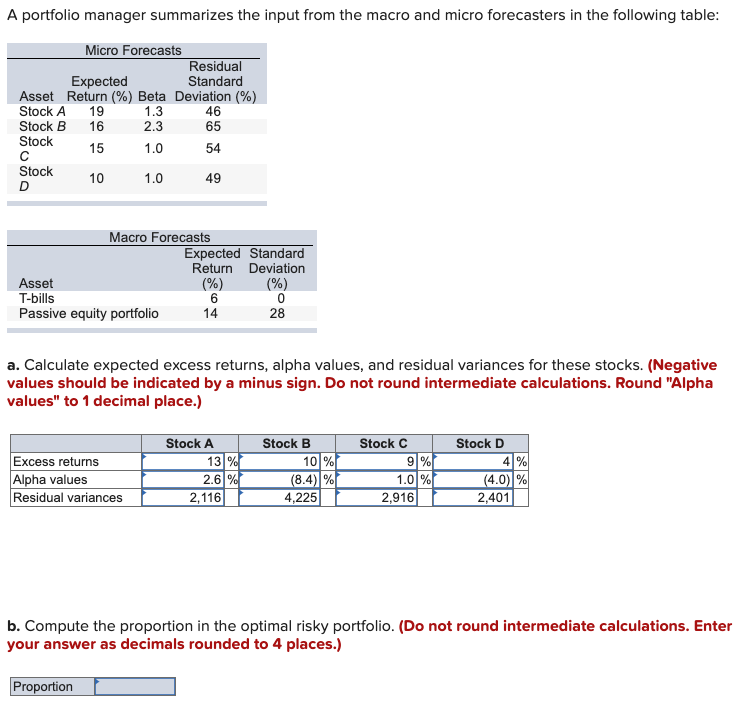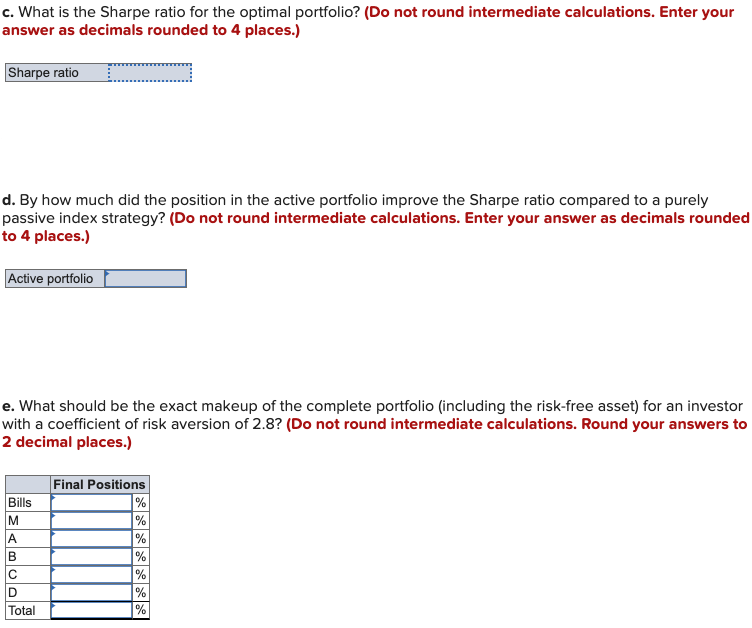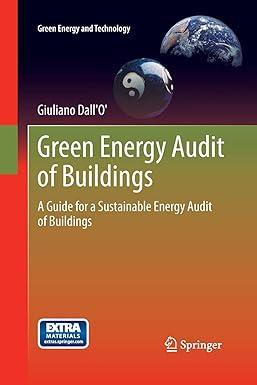
 Please provide details for parts b,c,d and e. Thank you!!!
Please provide details for parts b,c,d and e. Thank you!!!
A portfolio manager summarizes the input from the macro and micro forecasters in the following table: Micro Forecasts Residual Expected Standard Asset Return (%) Beta Deviation (%) Stock A 19 1.3 46 Stock B 16 2.3 65 Stock 15 1.0 54 Stock 10 1.0 49 D Macro Forecasts Expected Standard Return Deviation Asset (%) (%) T-bills 6 0 Passive equity portfolio 14 28 a. Calculate expected excess returns, alpha values, and residual variances for these stocks. (Negative values should be indicated by a minus sign. Do not round intermediate calculations. Round "Alpha values" to 1 decimal place.) Excess returns Alpha values Residual variances Stock A 13% 2.6% 2,116 Stock B 10% (8.4)% 4,225 Stock C 91% 1.01% 2,916 Stock D 4% (4.0) % 2,401 b. Compute the proportion in the optimal risky portfolio. (Do not round intermediate calculations. Enter your answer as decimals rounded to 4 places.) Proportion c. What is the Sharpe ratio for the optimal portfolio? (Do not round intermediate calculations. Enter your answer as decimals rounded to 4 places.) Sharpe ratio d. By how much did the position in the active portfolio improve the Sharpe ratio compared to a purely passive index strategy? (Do not round intermediate calculations. Enter your answer as decimals rounded to 4 places.) Active portfolio e. What should be the exact makeup of the complete portfolio (including the risk-free asset) for an investor with a coefficient of risk aversion of 2.8? (Do not round intermediate calculations. Round your answers to 2 decimal places.) Final Positions Bills M A B C D Total % % % % % % A portfolio manager summarizes the input from the macro and micro forecasters in the following table: Micro Forecasts Residual Expected Standard Asset Return (%) Beta Deviation (%) Stock A 19 1.3 46 Stock B 16 2.3 65 Stock 15 1.0 54 Stock 10 1.0 49 D Macro Forecasts Expected Standard Return Deviation Asset (%) (%) T-bills 6 0 Passive equity portfolio 14 28 a. Calculate expected excess returns, alpha values, and residual variances for these stocks. (Negative values should be indicated by a minus sign. Do not round intermediate calculations. Round "Alpha values" to 1 decimal place.) Excess returns Alpha values Residual variances Stock A 13% 2.6% 2,116 Stock B 10% (8.4)% 4,225 Stock C 91% 1.01% 2,916 Stock D 4% (4.0) % 2,401 b. Compute the proportion in the optimal risky portfolio. (Do not round intermediate calculations. Enter your answer as decimals rounded to 4 places.) Proportion c. What is the Sharpe ratio for the optimal portfolio? (Do not round intermediate calculations. Enter your answer as decimals rounded to 4 places.) Sharpe ratio d. By how much did the position in the active portfolio improve the Sharpe ratio compared to a purely passive index strategy? (Do not round intermediate calculations. Enter your answer as decimals rounded to 4 places.) Active portfolio e. What should be the exact makeup of the complete portfolio (including the risk-free asset) for an investor with a coefficient of risk aversion of 2.8? (Do not round intermediate calculations. Round your answers to 2 decimal places.) Final Positions Bills M A B C D Total % % % % % %

 Please provide details for parts b,c,d and e. Thank you!!!
Please provide details for parts b,c,d and e. Thank you!!!





